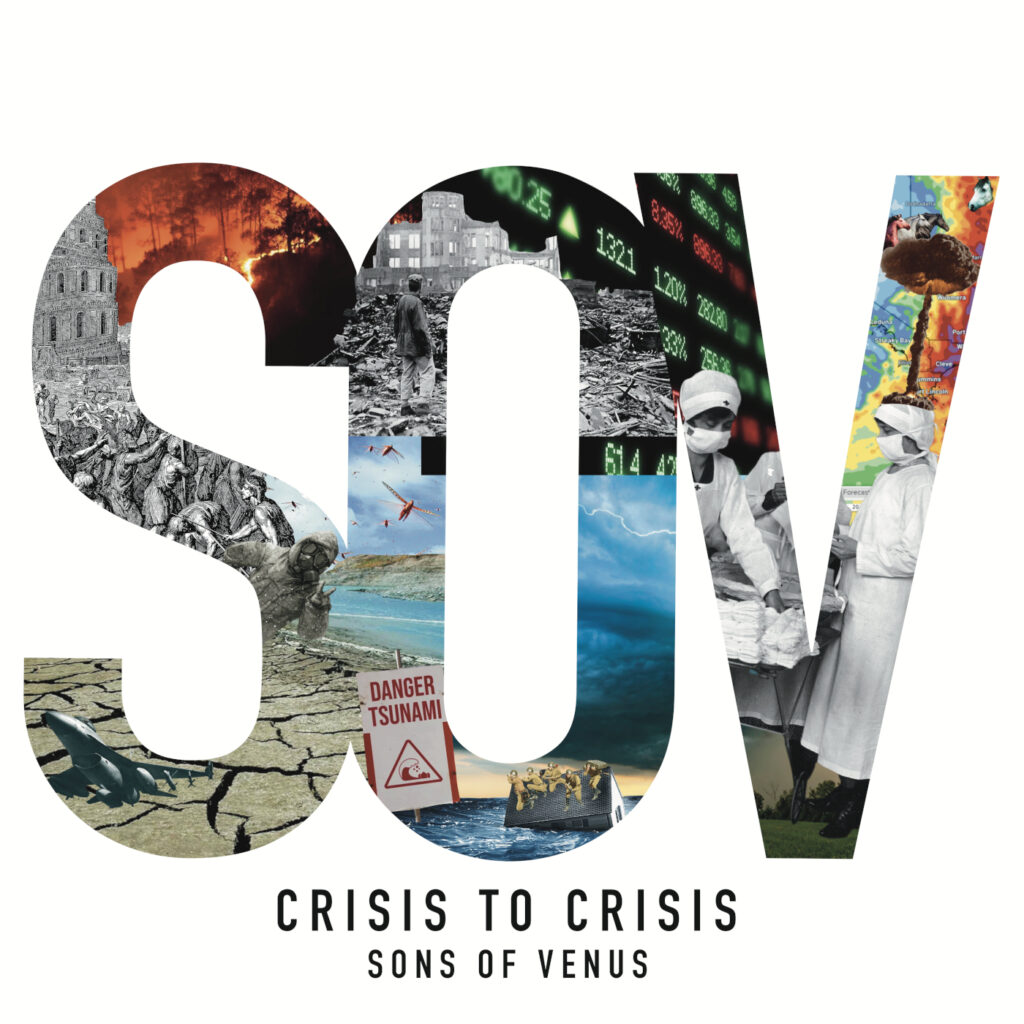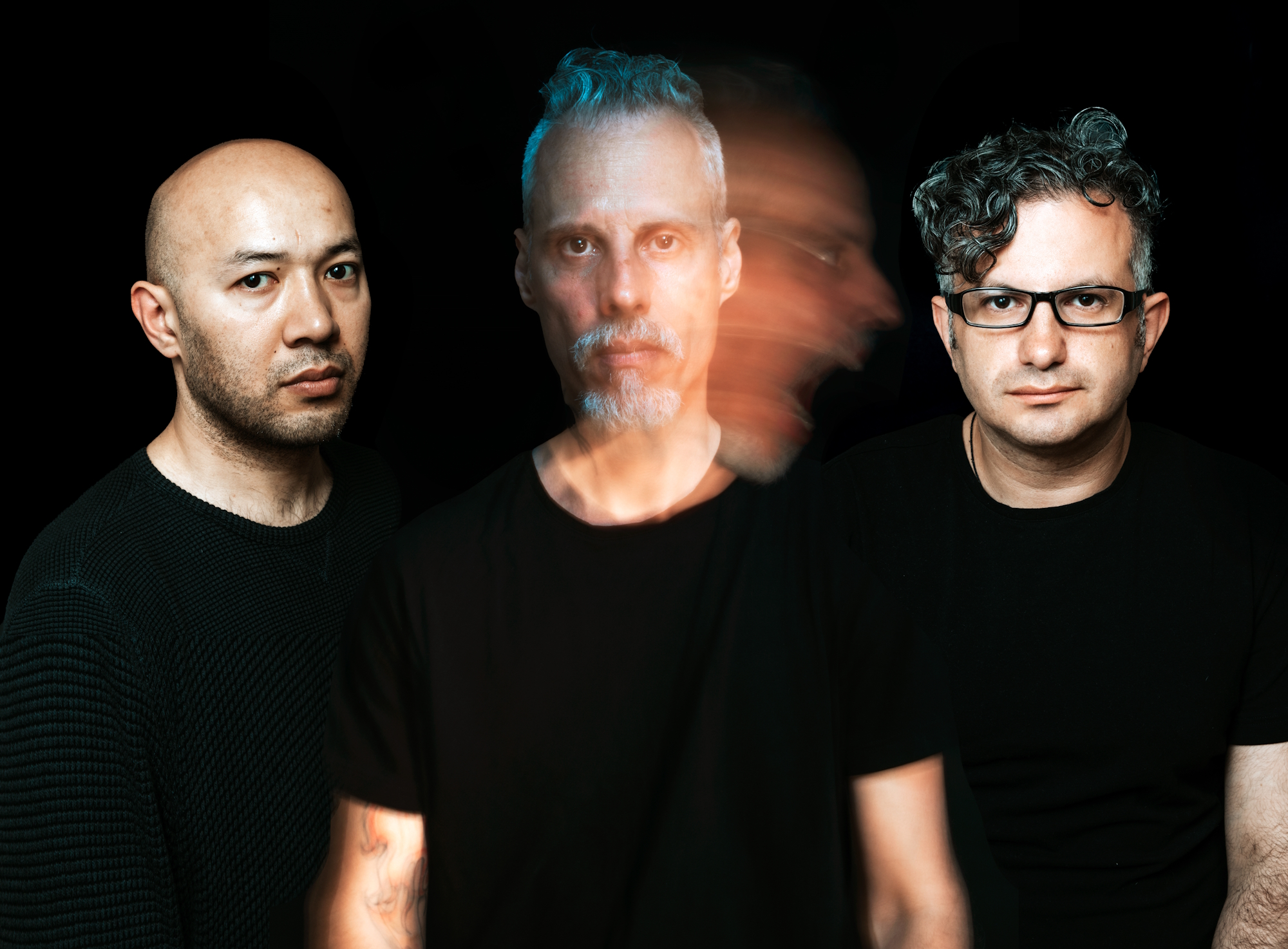Sons Of Venus is a New York experimental, psychedelic, prog multimedia project, comprised of musicians and artists John Sully, Igor Reznik, and Ruslan Baimurzin. The project came about after Ruslan had been in different bands with Igor, and he met John in the city’s East Village, and immediately hit it off.
Igor explains, “[Me and Ruslan] were in a band called The Clox, which eventually John and another guy, they joined, and then when that band kind of broke up, instead of breaking up, we transformed into the Sons Of Venus. Actually, the lead singer of The Clox, he left at the moment when we had a big show coming up, and we just ended up winging it, writing another song, and just kind of improvising our way through the old song structure.”
The Clox had some support dates with The Jelly Jam – a supergroup comprised of members from Dream Theater, King’s X and Dixie Dregs – when their singer quit. On the first practice session immediately after, Igor says, “I remember that rehearsal, because I came depressed, and I was in a panic, and [I] came to the rehearsal, and I was like, ‘That’s it; we have to cancel these shows. The band is over,” and these two guys were like, ‘No! Let’s just write a song!’ [Laughs] And we wrote a song in, like, an hour!”
“Because we had already been playing and we had this chemistry, right from the beginning, so you can’t deny that it’s there,” Ruslan expands. “And I think this is most important: when there’s a chemistry, the band exists, and when there’s no chemistry, then the band doesn’t exist. So, we have a really good chemistry. We feel each other, as musicians.”

(L-R): Igor Reznik, John Sully and Ruslan Baimurzin
Photo by Ilya Popenko. Courtesy of 1K Music PR
“Really how I would define Sons Of Venus is a language,” says John. “We speak Sons Of Venus language. The three of us get together, we don’t need to discuss anything, we don’t need to talk about the day before, the day after, we don’t need to do anything but just start doing Sons Of Venus, and it’s just a conversation, just like you and I are having right now, it’s literally just like that.”
Once the band got going, there was an immediate interest from those who heard them. Talking about the first song the band wrote as Sons Of Venus, “Hold On,” Ruslan says, “This song was on the first album, called ‘Hold On,’ and I remember, this was the first time in my life – maybe John had it; he’s the longest who played music – but we just wrote this song, like, a week or two weeks before the show, and [this] guy just shows up, after we performed it at the show, he was like, ‘Where can I listen to it? Where can I find it? Is it on iTunes?’ I was like, ‘We just played it, like, the third time! We haven’t recorded it yet!’”
This improvisational style bled over when the band began recording their music. Uniquely, when they recorded their first self-titled album, John, who is also a multimedia artist and curator with a special interest in collage making, would allow Igor and Ruslan full reign to record whatever they wanted, for as long as they wanted, only to then edit the piece down, and then go back into the recording studio and record the curated piece as a song. Then, their second album, Adventures in Caution, was entirely improvised while recorded.

Courtesy of 1K Music PR
Their third album, out tomorrow, is called Crisis to Crisis, and is the first of theirs to be released on a label, Glasstone Records. “On this particular record, because of COVID and because of the lockdown, I just had a lot of ideas that were coming through,” says John on the album. “To go into our process a little bit, there’s definitely a feeling when the three of us are in a room together, when we play, that is super easy and super automatic, and we just know it. But I wanted to do an experiment: Since I couldn’t be with them, what if I just imagined them there? So, I kind of did, like, an inner thing, and then I did the same thing: I put up the microphones, I grabbed my guitar, I had my pedalboards set up, and I just played, as if they were right there with me, playing. And I did a lot of music; basically, the whole record. And I edited it, I sang to it, I laid the keyboards on it, I did the sound design on it, and then I sent it to them, really kind of not saying much other than just sending it to them, because if they were like, ‘Oh, yeah, it’s OK,’ you know? ‘Thanks for sending it.’ If they didn’t respond to it in a certain way, I would have just left it at that, but both of them responded very similarly, like, ‘I would love to play on this. I feel like I could just play right on this, and it feels like this could be our third record.’”
On the concept behind the record, John says, “Crisis to Crisis is the title, obviously. Really, when I’m saying, ‘Crisis to crisis,’ really, I’m talking about the media…So, the whole album’s a commentary on how they locked us down – and when I say ‘they,’ watch the ‘Living in Blood’ video, that’s the ‘they’ – how they locked us in, and then all we had to rely on was the media, [Holds up phone] through these things, right? So, it’s just a reaction to that, one hundred percent. Every track.”
Ruslan adds, “But, actually, even before all these things [have been] happening, we’ve been living in this, for years – for generations, basically – from crisis to crisis, which every week or every second week, you can hear it in the news; something terrible happens. You know, it can be the war, or some kind of bad news, and the news always gives you the crisis, and never says, ‘Hey! Remember there was some kind of crisis? So, we resolved it.’ They never say this, you know? So, instead of resolving the problem or telling the people they resolved it, they create a new problem to cover the old problem, and people are already forgetting about the old problem, and focusing on the new problem, which is not going to be resolved, and we actually be living this and we are living this.”
Igor adds his view, “I would continue this, to say that I think it’s a personal reflection of a human soul, as being constantly distracted. We’re distracted by these things. We are, right now, this is what we are. We get angry, we distract ourselves from that being, from what we are, originally, and, in the name and all these songs, we just ask ‘Why?’ You know? ‘Why? What the fuck?’”
Sons Of Venus’ latest album Crisis to Crisis is out tomorrow to stream and purchase. You can follow the band on Facebook and Instagram to keep up to date with them. To hear a much more extensive conversation, including our discussion on the album’s first single “Living in Blood,” the making of their music and videos, how their sound differs between a live and studio setting, their philosophies as a band, the band as a multimedia project and more, check out the latest edition of POSTBURNOUT.COM Interviews…, which premieres today at 17:00 (Irish Standard Time) on YouTube and will be on all other platforms afterward.

Aaron Kavanagh is the Founder and Editor-in-Chief of Post-Burnout. His writing can also be found in the Irish Daily Star, Buzz.ie, Totally Dublin, The GOO, Headstuff, New Noise Magazine, XS Noize, DSCVRD and more.

 POST-BURNOUT
POST-BURNOUT